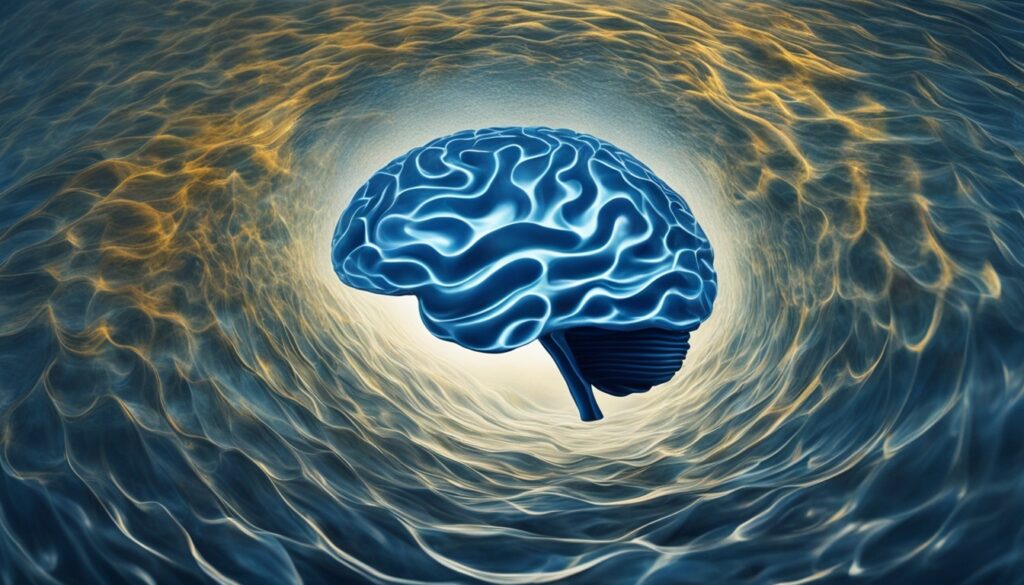A study found over1 1,212 references on omega-3 fatty acids and mental health. This research by three Evidence-based Practice Centers highlights how these nutrients help our brains and minds. They support brain function, cognitive performance, and mental well-being1.
Omega-3s, like EPA and DHA, are known for many health benefits. They are key for mental clarity, mood, and thinking skills2.
This article shows how omega-3s greatly benefit mental health. They help with depression, bipolar disorder, and anxiety. These nutrients make a big difference in our mental health23.,

Key Takeaways
- Omega-3 fatty acids, including EPA and DHA, play a crucial role in maintaining brain health and cognitive function.
- Research has shown that omega-3 supplementation can help alleviate the symptoms of depression and stabilize mood in individuals with bipolar disorder.
- Omega-3s possess anti-inflammatory properties and can help regulate the body’s stress response, contributing to improved mental clarity and emotional well-being.
- Dietary sources of omega-3s, such as fatty fish, are essential for meeting the body’s needs, but supplementation may be necessary for those with deficiencies or specific health conditions.
- Ongoing research continues to explore the potential benefits of omega-3s for a wide range of mental health conditions, including anxiety, ADHD, and cognitive decline.
Introduction to Omega-3 Fatty Acids
What are Omega-3 Fatty Acids?
Omega-3 fatty acids are a type of fat that our bodies can’t make on their own4. They are key for our health and help with cell functions, especially in the eyes and brain4. There are three main types: eicosapentaenoic acid (EPA), docosahexaenoic acid (DHA), and alpha-linolenic acid (ALA)4.
Sources of Omega-3 Fatty Acids
You can get omega-3s from both fish and plants4. Fish like salmon, anchovy, mackerel, sardines, and trout are great sources4. But, fish like marlin, shark, swordfish, and tilefish have more mercury and should be eaten less often4.
For those who can’t eat fish, there are plant-based options like flaxseeds, chia seeds, and walnuts4.
The amount of omega-3s you need depends on your gender and age4. Women should aim for 1.1 grams of ALA daily, while men should get 1.6 grams4. Always talk to a doctor before taking omega-3 supplements to get the right amount and avoid problems like too much bleeding4.
“Omega-3 fatty acids are vital in maintaining cell functions, especially in cells located in the eyes and brain.” –4
The Link Between Omega-3 and Mental Health
Research has found a strong link between omega-3 fatty acids and mental health. Omega-3 fish oil is rich in EPA and DHA, which are vital for brain health5. But, only a small part of ALA turns into EPA or DHA, making it crucial to eat fatty fish or take supplements5.
Pregnant women who eat fish or take fish oil have smarter kids5. DHA in the brain helps with learning and memory, and not having enough of it can cause problems5. In older adults, low DHA levels mean a smaller brain, which can make them age faster5.
Omega-3 also helps with mental health issues like depression and bipolar disorder. Supplements with more EPA can make depression better, especially with antidepressants5. But, they don’t help much with Alzheimer’s disease5.
Depression is less common where people eat more fish, showing fish’s health benefits5. A theory links schizophrenia to omega-3 levels, suggesting it could help explain the disorder6.
Studies show a clear link between omega-3 and mental health. This includes brain function, development, and managing mood disorders. Knowing this can help with diet and supplements for better health.
Benefits of Omega-3 for Depression
Many studies have looked into how omega-3 fatty acids, especially EPA and DHA, help with depression7. They show how important it is to consider recall bias in mental health studies7. A study on depression and its links with other health issues gives us useful data7.
Studies on Omega-3 and Depression
Research has shown that omega-3 supplements can help with depression7. A study by Golding et al. (2009) found that low omega-3 intake from fish can lead to high depressive symptoms in pregnant women7. Another study by Noaghiul and Hibbeln (2003) linked seafood eating to bipolar disorders7. Older adults with certain fatty acid levels in their blood were also found to be more likely to have depression7.
Many studies have found links between fatty acids, omega-3 types, and major depression7. Freeman et al. (2006) looked into how omega-3 can treat psychiatric issues7. Montgomery and Richardson’s (2008) review checked if omega-3 helps with bipolar disorder7.
Recommended Dosages for Depression
The right amount of omega-3 for depression can vary8. A study showed that higher doses of omega-3 (4g/day) helped improve motivation in people with depression over 12 weeks8. But, most over-the-counter omega-3 products have much less EPA than the 4g used in the study8.
The U.S. FDA suggests eating 2-3 servings of fish a week for adults, with each serving being 4 ounces9. Kids should eat 2 ounces9. Taking fish oil or omega-3 supplements at the right dose is key to avoid bad effects like high LDL cholesterol, trouble controlling blood sugar, and bleeding risks9.

Even though omega-3 fatty acids look promising for depression, talk to a healthcare professional before starting supplements. They can interact with other medicines9.
Omega-3 and Bipolar Disorder
Omega-3 fatty acids could help manage bipolar disorder. Research shows they might improve mood and be a good addition to usual treatments10.
Mood Stabilizing Effects of Omega-3
Studies link omega-3 to better mental health. In places like Japan, where seafood is common, fewer people have bipolar disorder1011.
A study by Penn State University and the University of North Carolina looked at omega-3 and omega-6 in bipolar disorder. Those eating more omega-3s felt better, with less mood swings and irritability10.
Though symptoms didn’t drop much in 12 weeks, mood stability was key. This shows how important it is for treatment10.
“Increased mood stability is highlighted as a crucial treatment aim in managing bipolar disorder, even though the study’s duration might not have been sufficient to show significant overall symptom improvement.”
Omega-3s could help stabilize mood and lessen mood swings in bipolar disorder10.
Overall, omega-3s could be a helpful addition to treatment for bipolar disorder. They might make mood more stable and reduce symptoms1011.
Potential Benefits for Other Mental Health Conditions
Researchers are looking into how omega-3 fatty acids might help with mental health issues. They’re studying their effects on things like cognitive impairment, dementia, schizophrenia, and ADHD12.
Some studies show omega-3 could improve brain function. It might even slow down age-related brain decline and diseases like Alzheimer’s13. Also, kids with ADHD might have less omega-3 in their blood, which could be linked to the condition13.
For people with schizophrenia, omega-3 levels are often low14. Taking omega-3 supplements along with their medicine might help protect brain cells and reduce stress. This could make symptoms better14.

While we don’t know as much about omega-3 and other mental health issues as we do about depression and bipolar, research is ongoing. Eating foods rich in omega-3 could help your mental health13.
The Benefits of Omega-3 Fatty Acids for Mental Health
Omega-3 fatty acids are key for mental health. They are mainly found in fatty fish and help with brain function, mood, and health. The benefits of omega-3 for mental health, mood, cognitive performance, and anti-inflammatory effects are well-studied.
Studies show omega-3s help with depression and mood in people with bipolar disorder15. They also help prevent cognitive decline and dementia, keeping the brain healthy as we age15.
Omega-3s also fight inflammation, which is linked to many health problems, including mental health issues15.
“Incorporating omega-3 fatty acids into a balanced, heart-healthy diet can be a simple yet powerful step towards supporting both physical and mental wellbeing.”
While research looks good, results can vary from person to person. Always talk to a healthcare professional before starting supplements or changing your diet16.

Omega-3s are key for good mental health. Adding them to your diet or supplements can greatly improve your overall health1615.
Safety and Drug Interactions
Omega-3 fatty acids are usually safe, but it’s key to know about omega-3 side effects and omega-3 interactions with medications. Taking anticoagulants like aspirin or warfarin with omega-3s might increase bleeding risk, even if studies aren’t clear on this17. Also, adjusting blood pressure meds might be needed with omega-3 supplements17.
Some omega-3 sources might have harmful substances like mercury or PCBs18. It’s important to pick high-quality omega-3 supplements or fish to avoid these toxins.
Potential Side Effects
Omega-3 supplements are usually safe, but they can sometimes cause issues. These include affecting blood sugar, making LDL cholesterol worse, causing fish allergies, and raising Vitamins A and D levels in some supplements17.
Drug Interactions
- Anticoagulants (like aspirin or warfarin) might not mix well with omega-3s, raising bleeding risk17.
- Omega-3s could affect blood pressure meds17.
Talk to your doctor before taking omega-3 supplements, especially if you have health issues or take other meds. Knowing about omega-3 safety and omega-3 drug interactions helps keep you healthy.

Vegetarian and Vegan Sources of Omega-3
For vegetarians and vegans, getting enough omega-3 fatty acids can be hard. The best sources are usually in fish and seafood. But, there are plant-based omega-3 sources that can help vegetarians and vegans meet their omega-3 needs. They can also look into omega-3 supplements for non-fish eaters19.
Plant-based foods like chia seeds, flaxseeds, and walnuts have omega-3 ALA. But, the body changes ALA into EPA and DHA poorly, less than 15%19. Vegetarians and vegans should try different plant-based omega-3 sources and think about omega-3 supplements for non-fish eaters too19.
- Chia seeds: 5.055g of ALA per 1 oz serving19
- Flaxseed oil: 6.703g of ALA per tablespoon19
- Walnuts: 3.346g of ALA per cup19
- Soybean oil: 0.92g of ALA per tablespoon19
- Wheat germ: 6.91g of ALA per cup19
Omega-3 fortified products like fruit juices, bread, eggs, milk, butter, and oils can also increase omega-3 intake for vegetarians and vegans19. Omega-3 supplements from fish oil, cod liver oil, krill oil, and algae oil are also good options19.
While plant-based omega-3 sources are great for vegetarians and vegans, it’s important to get a balanced amount. This is key for overall health and mental well-being1913.
The Importance of a Balanced Diet
Keeping a balanced diet rich in omega-3 is key for your mental health. You should add small, non-predatory fish to your meals often. Experts suggest eating about two 4-ounce servings of fatty fish each week for enough omega-3 fatty acids20.
Fish is packed with protein and has less saturated fat, making it a great choice for a heart-healthy diet. It replaces unhealthy red meat. Fish also gives you vitamins, minerals, and fats that help your health work better together20.
Some fish may have contaminants, but the benefits of eating fish are usually more important. Eating different fish like salmon, mackerel, and sardines helps you get enough omega-3 and other nutrients for a balanced diet20.
Eating fish regularly is good for your body and mind. Choosing foods high in omega-3 can help your overall health and might lower the risk of mental health issues21.
“Eating a diet rich in omega-3s can be an effective way to support mental health, alongside other lifestyle factors like exercise and stress management.” – Dietitian, Jane Doe
Make sure to add dietary sources of omega-3 to your meal plans. This step is crucial for a healthier lifestyle that helps both your body and mind22.
Omega-3 Supplements vs. Fish Consumption
You can get omega-3 fatty acids from supplements or food. Supplements give you a lot of omega-3 at once. But, eating fish and seafood gives you more nutrients23.
Research on omega-3 supplements shows they can help with heart health, brain and eye health, and fetal development23. Prescription fish oil capsules, like Lovaza, have a lot of omega-3s. They are often given to people with high triglycerides16.
Choosing the Right Fish
Look for fish like lake trout that are full of omega-3s23. Also, pick small, shorter-lived fish like sardines and mackerel. These fish have fewer toxins23.
You can also get omega-3s from nuts, seeds, plant oils, and fortified foods like eggs and milk16. Eating a mix of these sustainable fish choices helps you get the nutrients you need23.
“The EPA and DHA content of fish depends on the species, with Lake Trout being the highest at 3% EPA and DHA.”
Omega-3 supplements are easy to use, but eating low-mercury fish has more benefits23. It’s important to find the best way to get your omega-3s based on your health goals16.
Recommended Intake and Dosages
Getting the right amount of omega-3 fatty acids is key for your mental health. Experts suggest a daily intake of 250–500 mg of EPA and DHA for adults24. For alpha-linolenic acid, men need 1.6 grams and women 1.1 grams daily24.
For those with mental health issues, the dosage can change. A daily 850 mg of EPA and DHA cut heart attacks and sudden death by 25% and 45% respectively24. The American Heart Association advises about 1,000 mg of omega-3 for heart disease or heart failure24. If you have high triglyceride levels, aim for 4,000 mg of omega-3 daily24.
For mental health, specific omega-3 amounts help. Supplements of 200–2,200 mg daily can ease depression and anxiety24. High fish and omega-3 intake also lowers the risk of breast, prostate, and colon cancers24.
Pregnant and nursing moms need more omega-3. Experts suggest an extra 200–300 mg of DHA daily24. The FDA recommends 2 fish or seafood servings weekly for kids, with sizes based on age24.
Most guidelines suggest 250 mg to 4,000 mg of EPA and DHA daily for good health24. Always follow the supplement label and check the EPA and DHA levels for the right dosage24.
Organizations advise following the label instructions on omega-3 supplements and considering the EPA and DHA content in the supplement for optimal dosages24.
Ongoing Research and Future Prospects
Research on omega-3 fatty acids and mental health is ongoing. Experts are looking into how omega-3s help with cognitive issues, dementia, and more. They’re also studying their effects on depression, ADHD, and other mental health problems12.
Early results are promising. They show omega-3s could be key in supporting mental health in the future. For example, studies found that omega-3s can lower the risk of depression by 4%25.
Omega-3s might make antidepressants work better and help with mental health issues12. They also have positive effects at a cellular level, like making cell membranes more fluid and reducing inflammation12.
As research goes on, omega-3 fatty acids look very promising for mental health. By understanding how they affect the brain, doctors could create better treatments for mental health issues1225.
“The potential benefits of omega-3 fatty acids for mental health continue to be an active area of research.”
Conclusion
Omega-3 fatty acids are key for your mental health. They help reduce depression and anxiety symptoms. They also help keep mood stable in people with bipolar disorder2627.
Experts say eating foods rich in omega-3 is good for your heart and brain. Aim for 2 servings of small, non-predatory fish each week26. If you’re not getting enough omega-3 from food, fish oil supplements can help27.
Adding omega-3 fats to a healthy lifestyle can boost your mental health. Try eating more foods like salmon, mackerel, or walnuts. Your mind and body will be grateful2627.
FAQ
What are the benefits of omega-3 fatty acids for mental health?
Omega-3 fatty acids are good for the heart and might help with mental health too. They support brain function, help with mood, and reduce inflammation. This can be good for people with depression and bipolar disorder.
What are the main sources of omega-3 fatty acids?
You can get omega-3s from fish and plants. Fish like salmon, mackerel, and tuna are good sources. You can also get them from fish oil supplements. For plant-based options, try walnuts, flaxseeds, chia seeds, and algae.
How do omega-3s affect mental health?
Studies show that low omega-3 levels are linked to mental health issues like depression and schizophrenia. Omega-3s might help manage mood, reduce inflammation, and support brain health.
Can omega-3s help treat depression?
Yes, omega-3 supplements, especially EPA and DHA, could help with depression. Many studies suggest they should be part of depression treatment plans.
How do omega-3s affect bipolar disorder?
Omega-3s might help stabilize mood and ease bipolar disorder symptoms. Some doctors suggest adding omega-3s to treatments like antidepressants for bipolar disorder.
Are there any other mental health conditions that could benefit from omega-3s?
Researchers are looking into omega-3s for many mental health issues. These include cognitive problems, depression during pregnancy, schizophrenia, ADHD, and more. Early findings suggest omega-3s could support mental health.
Are there any safety concerns with taking omega-3 supplements?
Omega-3 supplements are usually safe but can affect some medicines. They might interact with blood thinners or blood pressure drugs. Also, fish-based omega-3s can have mercury and other contaminants. Always talk to a doctor before starting supplements.
How can vegetarians and vegans get enough omega-3s?
Vegetarians and vegans often don’t get enough omega-3s from food. Plant-based omega-3 supplements are an option, but they might not match fish-based sources. Eating foods like walnuts, flaxseeds, and chia seeds can also help.
How much omega-3 should I consume for mental health benefits?
Aim for 2 servings of fatty fish a week for general health, or 8-12 ounces total. For mental health issues, you might need more omega-3s, possibly through supplements, along with a healthy diet.
